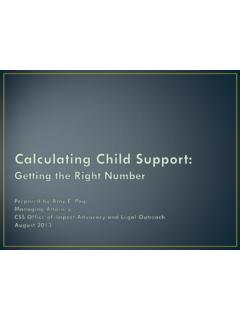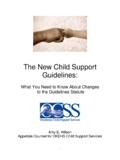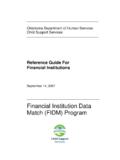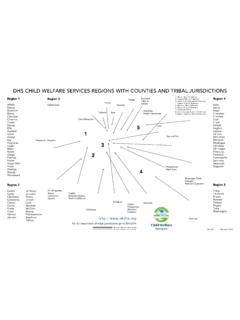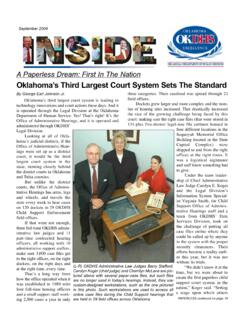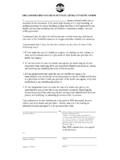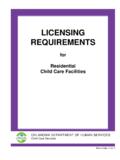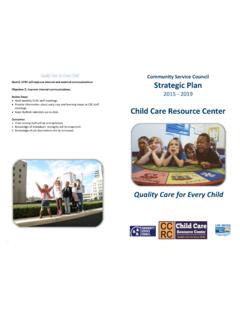Transcription of Oklahoma Core Competencies for Early Childhood …
1 Oklahoma core Competencies for Early Childhood Practitioners Oklahoma core Competencies for Early Childhood Practitioners 10/08. 1. 2. Table Of Contents Introduction 4. Content Areas Child Growth and Development 11. Health, Safety and Nutrition 15. Child Observation and Assessment 25. Family and Community Partnerships 30. Learning Environments and Curriculum 33. Creative Skills 38. Language Arts 39. Mathematics 40. Health, Safety and Nutrition 41. Science 42. Social and Personal Skills 43. Social Studies 44. Interactions with Children 47. Program Planning, Development and Evaluation 51. Professionalism and Leadership 55. Glossary 63. Resources 68. Feedback 71.
2 3. Oklahoma core Competencies for Early Childhood Practitioners Introduction This document was designed to be a comprehensive resource for any individual or organization providing programming for young children. core Competencies are what all adults who work with young children need to know, understand and be able to do to support children's learning and development. The Competencies use the word practitioner to indicate that the professionals in the Early Childhood field put knowledge into practice. Purpose and Goals Oklahoma core Competencies for Early Childhood Practitioners will provide a framework for the skills necessary to provide quality programs in all Childhood education and care settings.
3 Child development and Early Childhood teacher education programs may emphasize different theories, practices and content according to the educator's or institution's philosophy. By focusing on knowledge and skills that can be observed, the teacher educator can determine what someone needs to know in order to develop necessary skills for working with children. Realizing that skills develop over time, the Competencies writers worked from the premise that every advanced skill has a beginning. As Early Childhood practitioners grow, learn and practice, they become more effective in their programs and in their profession. The Oklahoma core Competencies can be used not only as a foundation for professional development in the state, but also to guide other activities: Providers, practitioners and teachers might use Competencies to assess their own skill levels in various content areas; determine their strengths and weaknesses; and plan for their own professional development (workshops, seminars, training and course work).
4 Directors and program administrators might use Competencies to write job descriptions, job education requirements, staff development plans and personnel policies. Training and training organizations might use Competencies to evaluate current offerings and plan educational opportunities that meet various content areas. 4. Higher education faculty, staff and administrators might use the Competencies to assess current program content to determine course development and design future course content. Policy makers, government agencies and planners might use the Competencies to guide program direction and enhance professionalism in the field. core Content Areas The core Competencies provide a framework of skills needed for each of the five skill levels.
5 These areas are identified as key categories. They are in no particular order and should be seen as equally important. The areas also overlap as all knowledge and practice are interrelated. core content areas include: Child Growth and Development Early Childhood practitioners use historical, current and emerging child development principles, theories and knowledge as the cornerstone of professional practice. Best practice is informed by and supports the nature of each child including all areas/domains: cognitive, physical, social and emotional and is inherently intertwined within the context of family and culture. Practitioners understand child growth and development and participate in ongoing learning and reflection.
6 Health, Safety and Nutrition Early Childhood practitioners understand that sound health, safety and nutrition practices provide the foundation for development and learning. Safe and healthy environments provide children and adults opportunities to learn and practice healthy behavior related to nutrition and meals, illness and accident prevention, dental and physical hygiene, emergency procedures and recognizing and reporting child abuse and neglect. Child Observation and Assessment Early Childhood practitioners use observation and authentic assessment to obtain information for appropriate curriculum planning, establishing outcomes for individuals and groups of children in partnership with families, and to determine a child's need for extra support.
7 Appropriate assessment strategies are developmentally, linguistically and culturally responsive. Practitioners engage in systematic, ongoing evaluation of their programs. 5. Family and Community Partnerships Early Childhood practitioners recognize families take many forms, and as practitioners respect and celebrate the diversity of values, strengths, customs and traditions. They understand and value the critical role of positive, collaborative partnerships with families, colleagues and community agencies. As community members, Early Childhood practitioners help connect children and families with available services. A strong network of family, friends and community partners is responsible for serving children.
8 Learning Environments and Curriculum Early Childhood practitioners demonstrate knowledge of how to create safe, playful, inviting, culturally appropriate and well- organized learning spaces for young children that promote physical, social-emotional, cognitive and creative development both indoors and out. Curriculum development is a collaborative, dynamic and ever-changing professional endeavor among all those who are involved in children's learning. A balanced curriculum includes adult and child directed activities, indoor and outdoor experiences, individual, small and large groups and blocks of uninterrupted time for children to engage in self-chosen activities which support the acquisition of skills, concepts, attitudes and disposition.
9 Creative Engaging children in activities with sand, water, play dough, dramatic play, blocks, creative stories, art, music, movement and a variety of other open-ended materials develops creative skills. Language Arts Children increase their communication, oral language and Early literacy skills by engaging in meaningful experiences that require them to effectively express their ideas and feelings, listen and understand others. Mathematics Children develop thinking and problem solving skills naturally through daily life activities such as playing in the sandbox, cooking applesauce, completing puzzles and sorting buttons. Health, Safety and Physical Development Children learn about their abilities, maintaining good health and gain independence when they take an active role in preparing nutritious snacks, maintaining a clean and healthy environment, engaging in physical activity and caring for their bodies.
10 Science Children develop science knowledge through observation, questioning, investigating and analyzing hands-on experiences with real animals, plants and objects in the classroom and the environment. 6. Social and Personal Skills Children develop successful social and personal skills when provided daily opportunities to negotiate issues that occur, to take turns, to lead and follow, to be a friend and to become aware of own feelings and the feelings of others. Social Studies Children learn about social studies through culturally diverse experiences in their families and environment. Interactions with Children Early Childhood practitioners demonstrate the ability to maintain authentic relationships with children, colleagues, families and community that are caring, connected and attached.
